Legal Requirements and Strategies for Police Interviewing
VerifiedAdded on 2020/05/16
|26
|6616
|166
Report
AI Summary
This report analyzes the legal and organizational requirements for interviewing suspects and witnesses in police investigations. It covers key aspects such as the Code of Practice for victims of crime, the Witness Charter, and the importance of human rights. The report details the PEACE model of interviewing (Planning and Preparation, Engage and Explain, Account, Closure, and Evaluation), outlining each stage and its significance. It explores resources for developing an interview strategy, including interview plans and considerations for different types of interviewees (vulnerable witnesses, intimidated individuals). The report emphasizes the importance of maintaining high standards, establishing professional relationships, and adapting techniques based on the interviewee's characteristics, such as cultural background, age, and health. It also addresses practical arrangements, the role of the interviewer and the need for empathy and sensitivity when dealing with vulnerable individuals. The report provides a comprehensive overview of the legal and practical aspects of police interviewing.
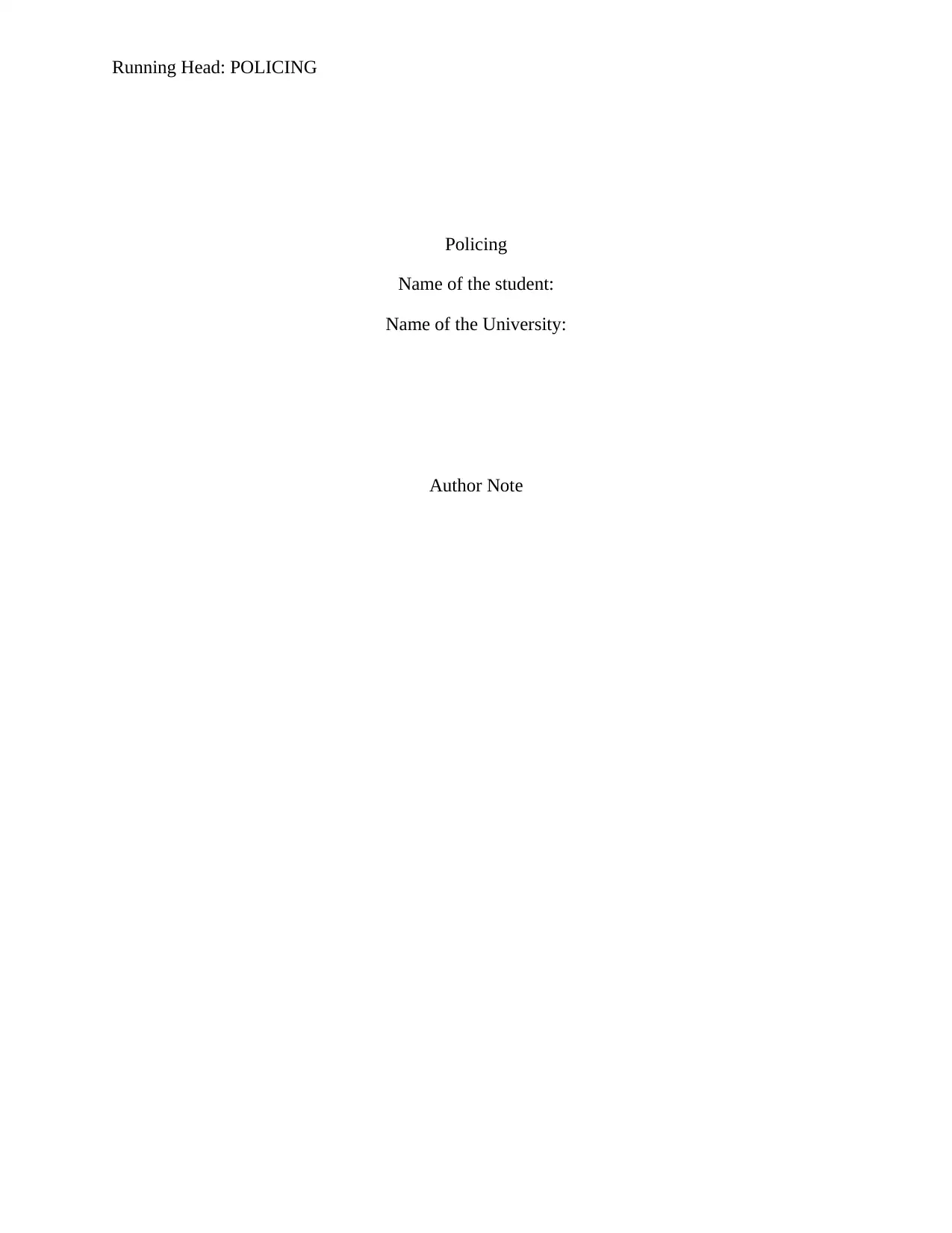
Running Head: POLICING
Policing
Name of the student:
Name of the University:
Author Note
Policing
Name of the student:
Name of the University:
Author Note
Paraphrase This Document
Need a fresh take? Get an instant paraphrase of this document with our AI Paraphraser
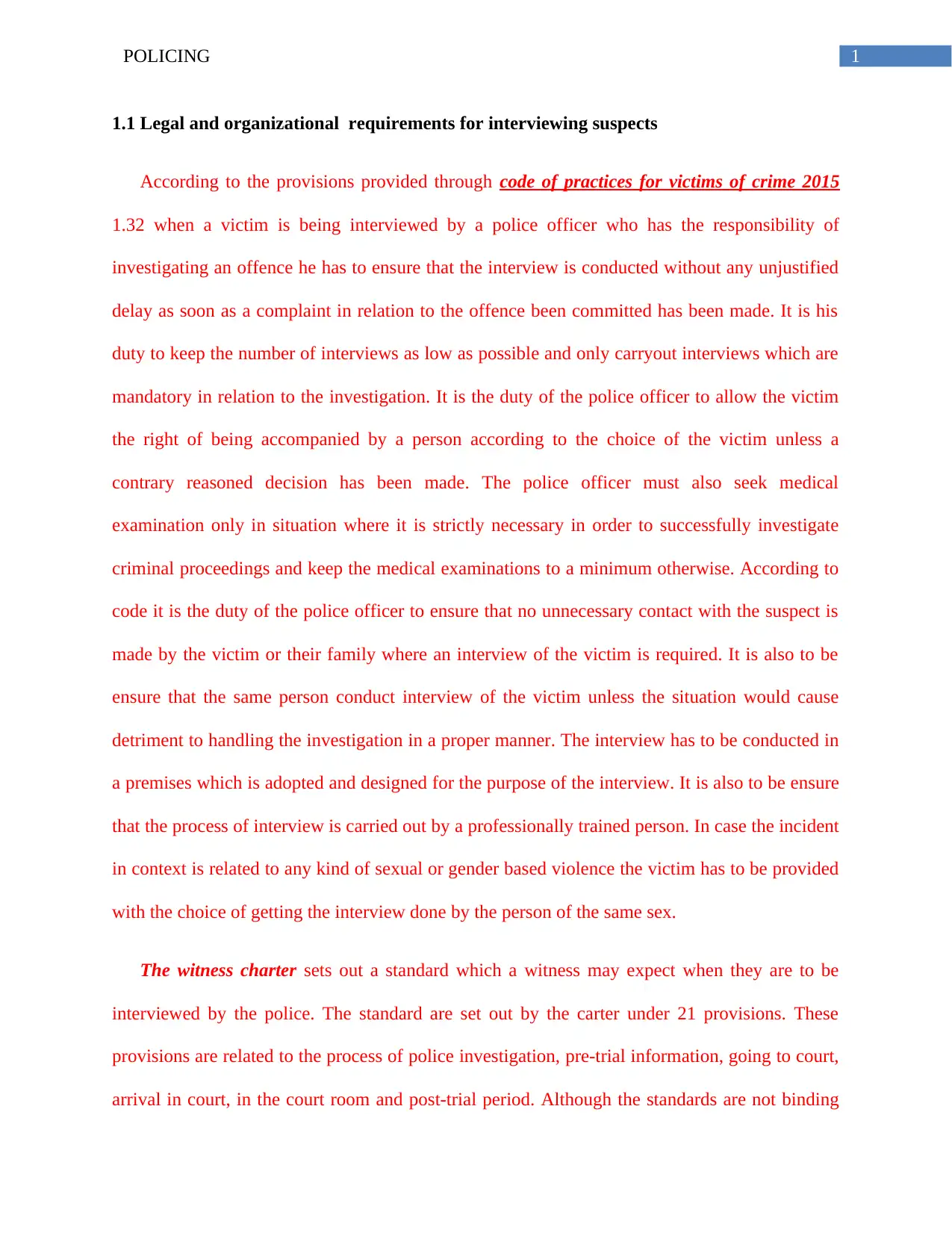
1POLICING
1.1 Legal and organizational requirements for interviewing suspects
According to the provisions provided through code of practices for victims of crime 2015
1.32 when a victim is being interviewed by a police officer who has the responsibility of
investigating an offence he has to ensure that the interview is conducted without any unjustified
delay as soon as a complaint in relation to the offence been committed has been made. It is his
duty to keep the number of interviews as low as possible and only carryout interviews which are
mandatory in relation to the investigation. It is the duty of the police officer to allow the victim
the right of being accompanied by a person according to the choice of the victim unless a
contrary reasoned decision has been made. The police officer must also seek medical
examination only in situation where it is strictly necessary in order to successfully investigate
criminal proceedings and keep the medical examinations to a minimum otherwise. According to
code it is the duty of the police officer to ensure that no unnecessary contact with the suspect is
made by the victim or their family where an interview of the victim is required. It is also to be
ensure that the same person conduct interview of the victim unless the situation would cause
detriment to handling the investigation in a proper manner. The interview has to be conducted in
a premises which is adopted and designed for the purpose of the interview. It is also to be ensure
that the process of interview is carried out by a professionally trained person. In case the incident
in context is related to any kind of sexual or gender based violence the victim has to be provided
with the choice of getting the interview done by the person of the same sex.
The witness charter sets out a standard which a witness may expect when they are to be
interviewed by the police. The standard are set out by the carter under 21 provisions. These
provisions are related to the process of police investigation, pre-trial information, going to court,
arrival in court, in the court room and post-trial period. Although the standards are not binding
1.1 Legal and organizational requirements for interviewing suspects
According to the provisions provided through code of practices for victims of crime 2015
1.32 when a victim is being interviewed by a police officer who has the responsibility of
investigating an offence he has to ensure that the interview is conducted without any unjustified
delay as soon as a complaint in relation to the offence been committed has been made. It is his
duty to keep the number of interviews as low as possible and only carryout interviews which are
mandatory in relation to the investigation. It is the duty of the police officer to allow the victim
the right of being accompanied by a person according to the choice of the victim unless a
contrary reasoned decision has been made. The police officer must also seek medical
examination only in situation where it is strictly necessary in order to successfully investigate
criminal proceedings and keep the medical examinations to a minimum otherwise. According to
code it is the duty of the police officer to ensure that no unnecessary contact with the suspect is
made by the victim or their family where an interview of the victim is required. It is also to be
ensure that the same person conduct interview of the victim unless the situation would cause
detriment to handling the investigation in a proper manner. The interview has to be conducted in
a premises which is adopted and designed for the purpose of the interview. It is also to be ensure
that the process of interview is carried out by a professionally trained person. In case the incident
in context is related to any kind of sexual or gender based violence the victim has to be provided
with the choice of getting the interview done by the person of the same sex.
The witness charter sets out a standard which a witness may expect when they are to be
interviewed by the police. The standard are set out by the carter under 21 provisions. These
provisions are related to the process of police investigation, pre-trial information, going to court,
arrival in court, in the court room and post-trial period. Although the standards are not binding
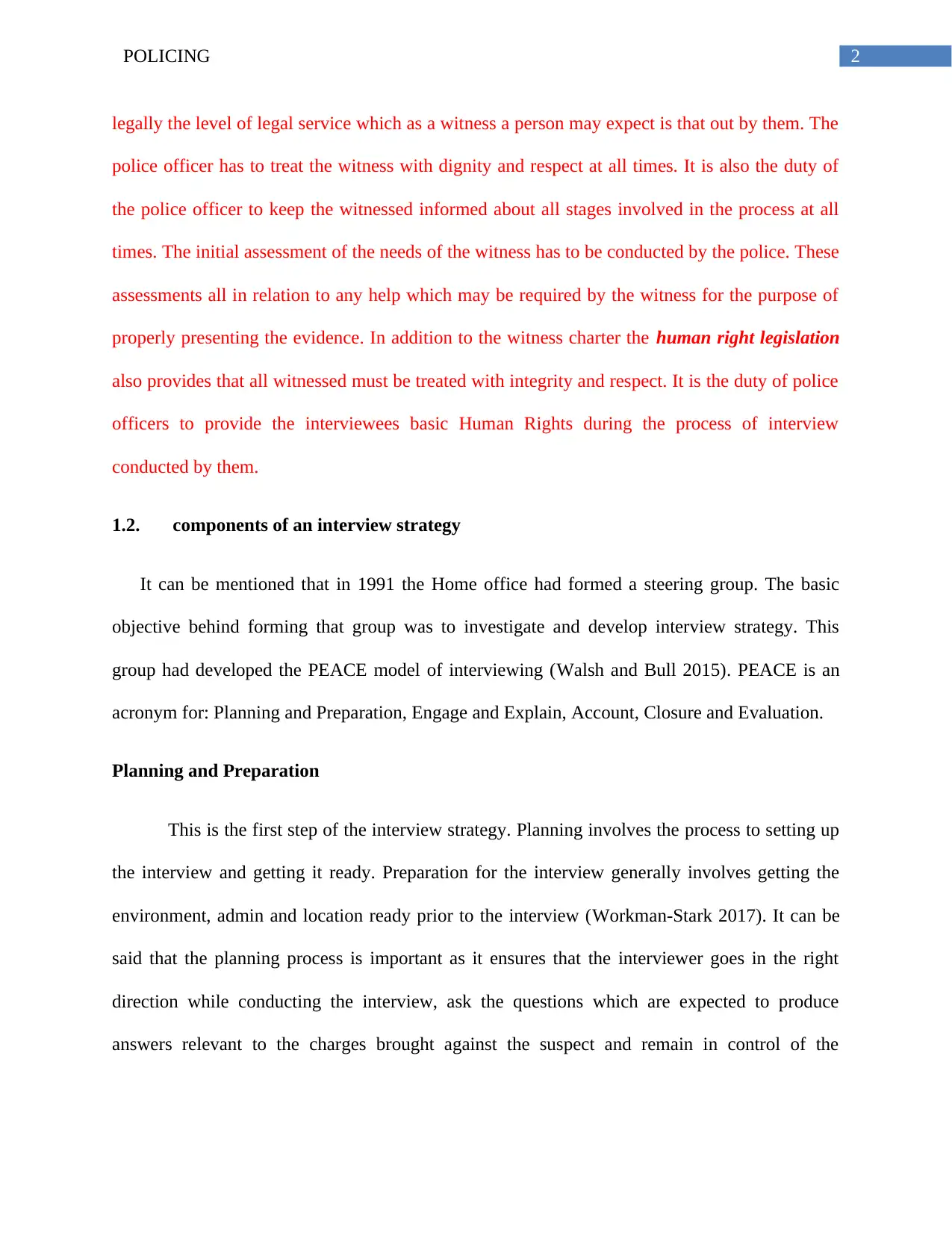
2POLICING
legally the level of legal service which as a witness a person may expect is that out by them. The
police officer has to treat the witness with dignity and respect at all times. It is also the duty of
the police officer to keep the witnessed informed about all stages involved in the process at all
times. The initial assessment of the needs of the witness has to be conducted by the police. These
assessments all in relation to any help which may be required by the witness for the purpose of
properly presenting the evidence. In addition to the witness charter the human right legislation
also provides that all witnessed must be treated with integrity and respect. It is the duty of police
officers to provide the interviewees basic Human Rights during the process of interview
conducted by them.
1.2. components of an interview strategy
It can be mentioned that in 1991 the Home office had formed a steering group. The basic
objective behind forming that group was to investigate and develop interview strategy. This
group had developed the PEACE model of interviewing (Walsh and Bull 2015). PEACE is an
acronym for: Planning and Preparation, Engage and Explain, Account, Closure and Evaluation.
Planning and Preparation
This is the first step of the interview strategy. Planning involves the process to setting up
the interview and getting it ready. Preparation for the interview generally involves getting the
environment, admin and location ready prior to the interview (Workman-Stark 2017). It can be
said that the planning process is important as it ensures that the interviewer goes in the right
direction while conducting the interview, ask the questions which are expected to produce
answers relevant to the charges brought against the suspect and remain in control of the
legally the level of legal service which as a witness a person may expect is that out by them. The
police officer has to treat the witness with dignity and respect at all times. It is also the duty of
the police officer to keep the witnessed informed about all stages involved in the process at all
times. The initial assessment of the needs of the witness has to be conducted by the police. These
assessments all in relation to any help which may be required by the witness for the purpose of
properly presenting the evidence. In addition to the witness charter the human right legislation
also provides that all witnessed must be treated with integrity and respect. It is the duty of police
officers to provide the interviewees basic Human Rights during the process of interview
conducted by them.
1.2. components of an interview strategy
It can be mentioned that in 1991 the Home office had formed a steering group. The basic
objective behind forming that group was to investigate and develop interview strategy. This
group had developed the PEACE model of interviewing (Walsh and Bull 2015). PEACE is an
acronym for: Planning and Preparation, Engage and Explain, Account, Closure and Evaluation.
Planning and Preparation
This is the first step of the interview strategy. Planning involves the process to setting up
the interview and getting it ready. Preparation for the interview generally involves getting the
environment, admin and location ready prior to the interview (Workman-Stark 2017). It can be
said that the planning process is important as it ensures that the interviewer goes in the right
direction while conducting the interview, ask the questions which are expected to produce
answers relevant to the charges brought against the suspect and remain in control of the
⊘ This is a preview!⊘
Do you want full access?
Subscribe today to unlock all pages.

Trusted by 1+ million students worldwide
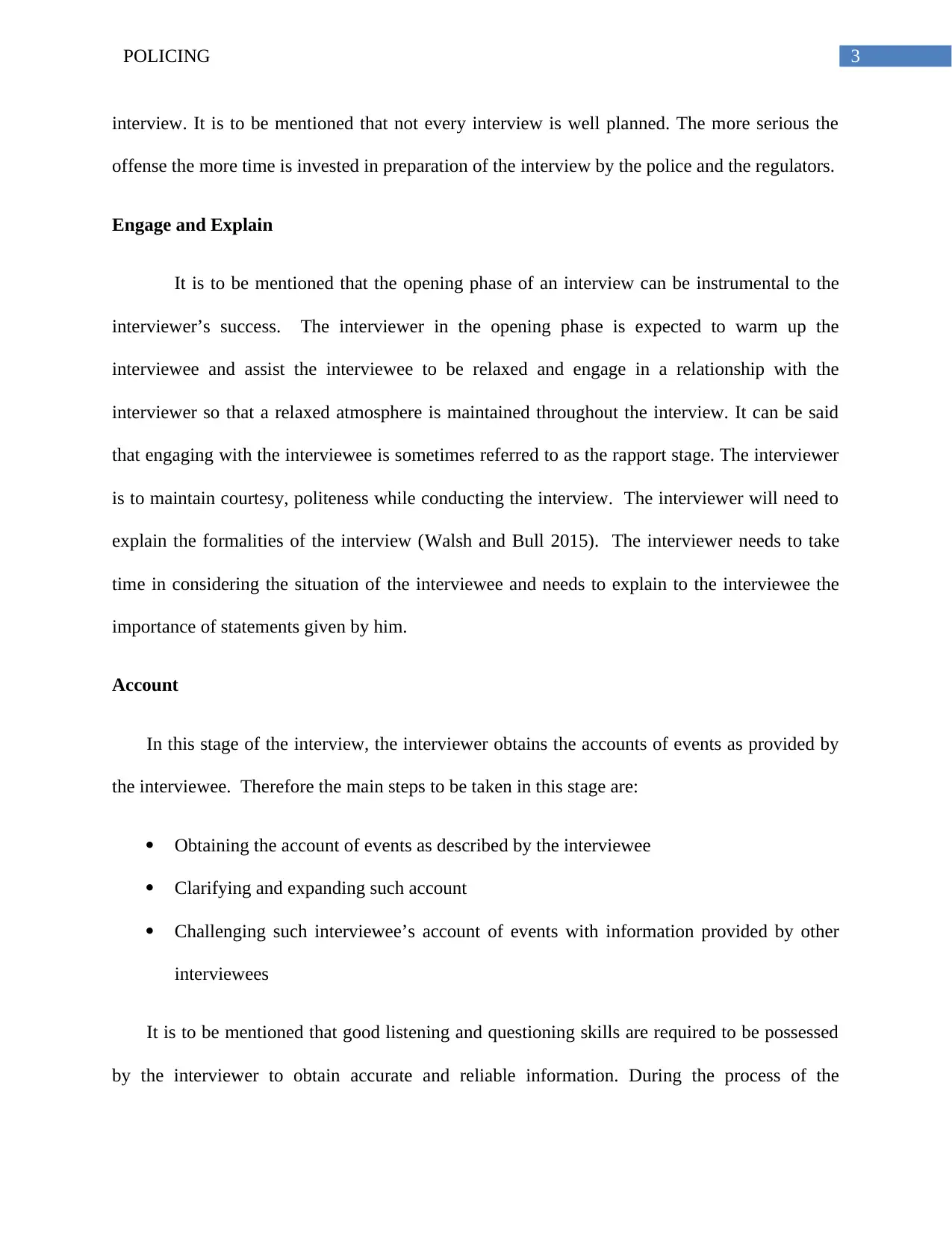
3POLICING
interview. It is to be mentioned that not every interview is well planned. The more serious the
offense the more time is invested in preparation of the interview by the police and the regulators.
Engage and Explain
It is to be mentioned that the opening phase of an interview can be instrumental to the
interviewer’s success. The interviewer in the opening phase is expected to warm up the
interviewee and assist the interviewee to be relaxed and engage in a relationship with the
interviewer so that a relaxed atmosphere is maintained throughout the interview. It can be said
that engaging with the interviewee is sometimes referred to as the rapport stage. The interviewer
is to maintain courtesy, politeness while conducting the interview. The interviewer will need to
explain the formalities of the interview (Walsh and Bull 2015). The interviewer needs to take
time in considering the situation of the interviewee and needs to explain to the interviewee the
importance of statements given by him.
Account
In this stage of the interview, the interviewer obtains the accounts of events as provided by
the interviewee. Therefore the main steps to be taken in this stage are:
Obtaining the account of events as described by the interviewee
Clarifying and expanding such account
Challenging such interviewee’s account of events with information provided by other
interviewees
It is to be mentioned that good listening and questioning skills are required to be possessed
by the interviewer to obtain accurate and reliable information. During the process of the
interview. It is to be mentioned that not every interview is well planned. The more serious the
offense the more time is invested in preparation of the interview by the police and the regulators.
Engage and Explain
It is to be mentioned that the opening phase of an interview can be instrumental to the
interviewer’s success. The interviewer in the opening phase is expected to warm up the
interviewee and assist the interviewee to be relaxed and engage in a relationship with the
interviewer so that a relaxed atmosphere is maintained throughout the interview. It can be said
that engaging with the interviewee is sometimes referred to as the rapport stage. The interviewer
is to maintain courtesy, politeness while conducting the interview. The interviewer will need to
explain the formalities of the interview (Walsh and Bull 2015). The interviewer needs to take
time in considering the situation of the interviewee and needs to explain to the interviewee the
importance of statements given by him.
Account
In this stage of the interview, the interviewer obtains the accounts of events as provided by
the interviewee. Therefore the main steps to be taken in this stage are:
Obtaining the account of events as described by the interviewee
Clarifying and expanding such account
Challenging such interviewee’s account of events with information provided by other
interviewees
It is to be mentioned that good listening and questioning skills are required to be possessed
by the interviewer to obtain accurate and reliable information. During the process of the
Paraphrase This Document
Need a fresh take? Get an instant paraphrase of this document with our AI Paraphraser
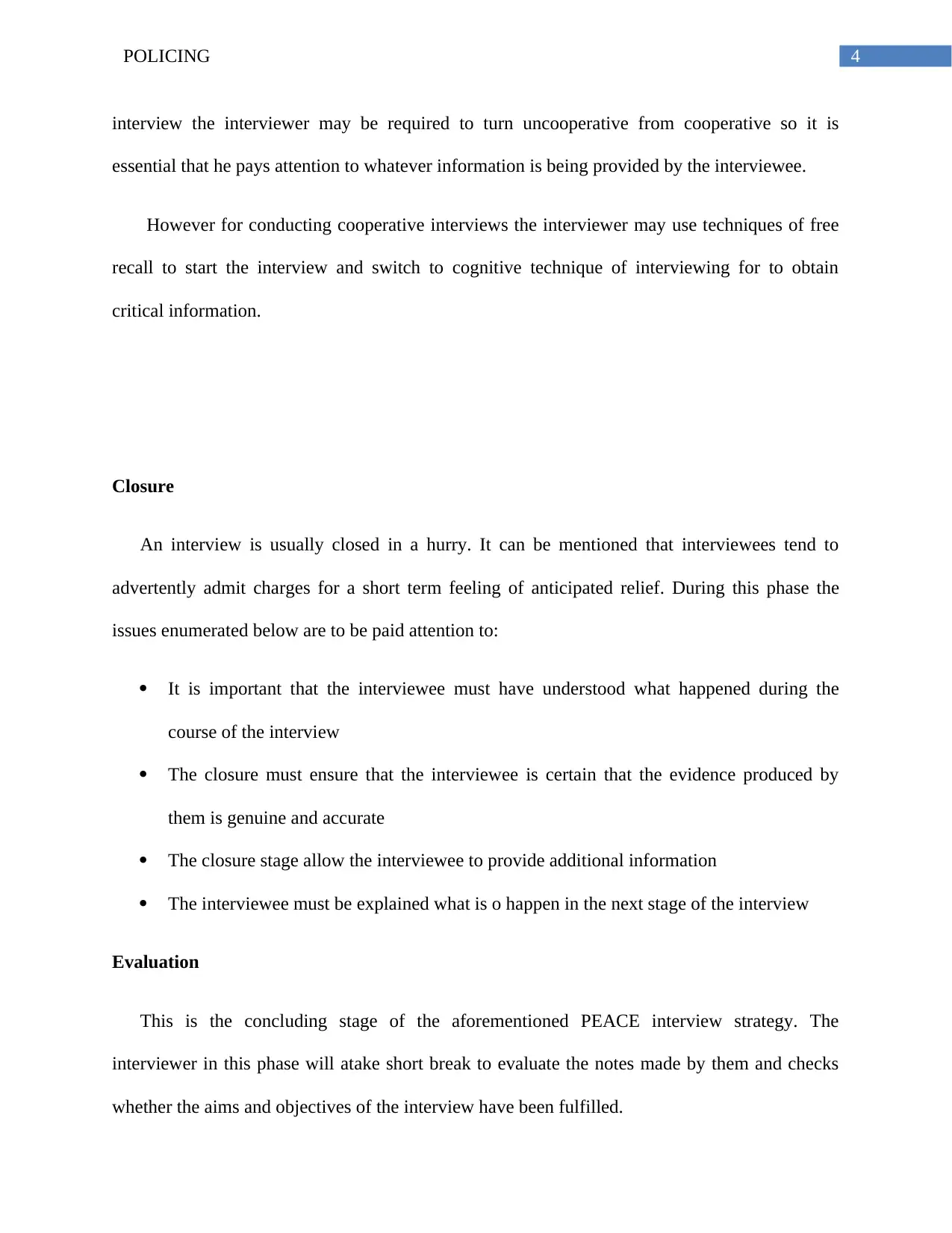
4POLICING
interview the interviewer may be required to turn uncooperative from cooperative so it is
essential that he pays attention to whatever information is being provided by the interviewee.
However for conducting cooperative interviews the interviewer may use techniques of free
recall to start the interview and switch to cognitive technique of interviewing for to obtain
critical information.
Closure
An interview is usually closed in a hurry. It can be mentioned that interviewees tend to
advertently admit charges for a short term feeling of anticipated relief. During this phase the
issues enumerated below are to be paid attention to:
It is important that the interviewee must have understood what happened during the
course of the interview
The closure must ensure that the interviewee is certain that the evidence produced by
them is genuine and accurate
The closure stage allow the interviewee to provide additional information
The interviewee must be explained what is o happen in the next stage of the interview
Evaluation
This is the concluding stage of the aforementioned PEACE interview strategy. The
interviewer in this phase will atake short break to evaluate the notes made by them and checks
whether the aims and objectives of the interview have been fulfilled.
interview the interviewer may be required to turn uncooperative from cooperative so it is
essential that he pays attention to whatever information is being provided by the interviewee.
However for conducting cooperative interviews the interviewer may use techniques of free
recall to start the interview and switch to cognitive technique of interviewing for to obtain
critical information.
Closure
An interview is usually closed in a hurry. It can be mentioned that interviewees tend to
advertently admit charges for a short term feeling of anticipated relief. During this phase the
issues enumerated below are to be paid attention to:
It is important that the interviewee must have understood what happened during the
course of the interview
The closure must ensure that the interviewee is certain that the evidence produced by
them is genuine and accurate
The closure stage allow the interviewee to provide additional information
The interviewee must be explained what is o happen in the next stage of the interview
Evaluation
This is the concluding stage of the aforementioned PEACE interview strategy. The
interviewer in this phase will atake short break to evaluate the notes made by them and checks
whether the aims and objectives of the interview have been fulfilled.
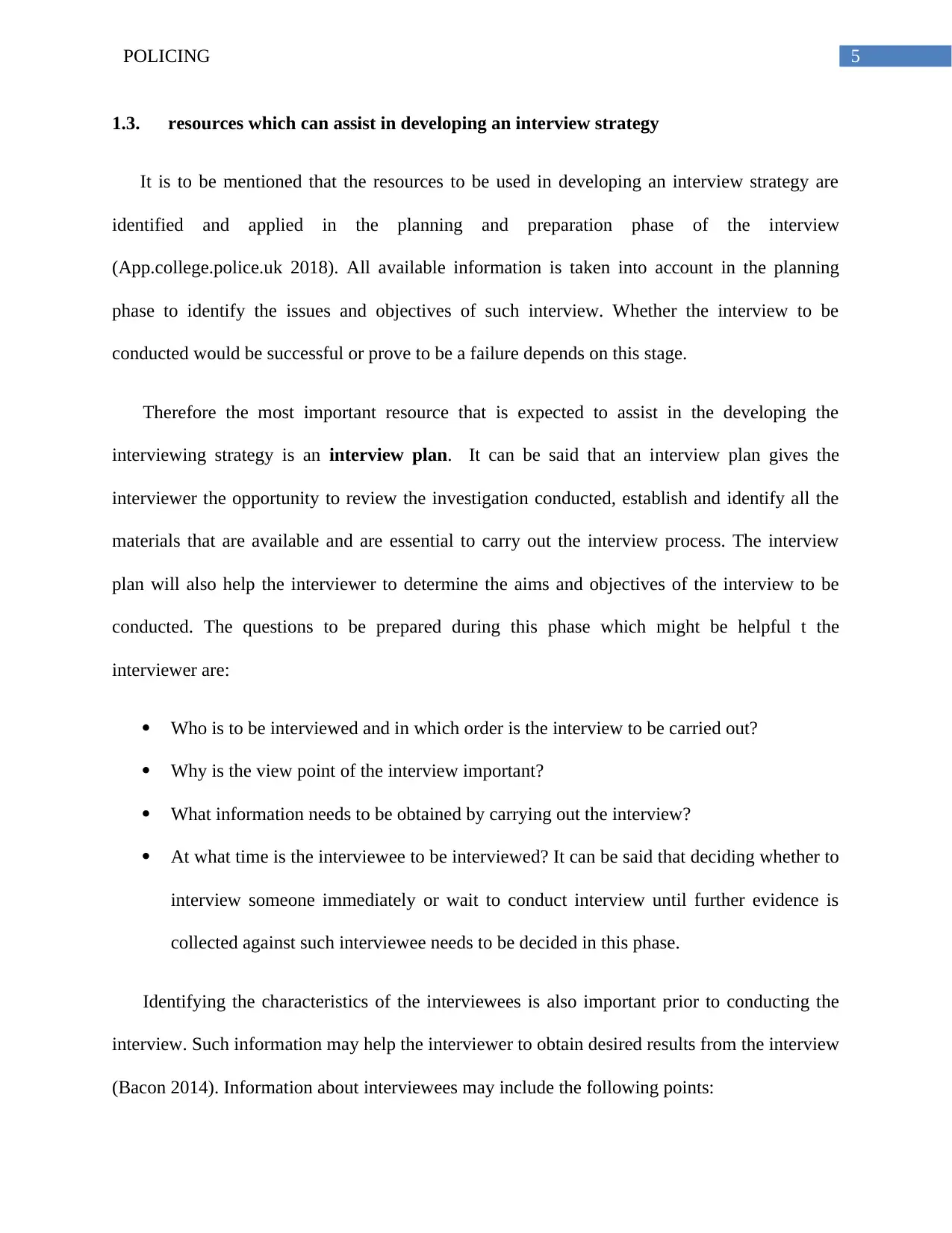
5POLICING
1.3. resources which can assist in developing an interview strategy
It is to be mentioned that the resources to be used in developing an interview strategy are
identified and applied in the planning and preparation phase of the interview
(App.college.police.uk 2018). All available information is taken into account in the planning
phase to identify the issues and objectives of such interview. Whether the interview to be
conducted would be successful or prove to be a failure depends on this stage.
Therefore the most important resource that is expected to assist in the developing the
interviewing strategy is an interview plan. It can be said that an interview plan gives the
interviewer the opportunity to review the investigation conducted, establish and identify all the
materials that are available and are essential to carry out the interview process. The interview
plan will also help the interviewer to determine the aims and objectives of the interview to be
conducted. The questions to be prepared during this phase which might be helpful t the
interviewer are:
Who is to be interviewed and in which order is the interview to be carried out?
Why is the view point of the interview important?
What information needs to be obtained by carrying out the interview?
At what time is the interviewee to be interviewed? It can be said that deciding whether to
interview someone immediately or wait to conduct interview until further evidence is
collected against such interviewee needs to be decided in this phase.
Identifying the characteristics of the interviewees is also important prior to conducting the
interview. Such information may help the interviewer to obtain desired results from the interview
(Bacon 2014). Information about interviewees may include the following points:
1.3. resources which can assist in developing an interview strategy
It is to be mentioned that the resources to be used in developing an interview strategy are
identified and applied in the planning and preparation phase of the interview
(App.college.police.uk 2018). All available information is taken into account in the planning
phase to identify the issues and objectives of such interview. Whether the interview to be
conducted would be successful or prove to be a failure depends on this stage.
Therefore the most important resource that is expected to assist in the developing the
interviewing strategy is an interview plan. It can be said that an interview plan gives the
interviewer the opportunity to review the investigation conducted, establish and identify all the
materials that are available and are essential to carry out the interview process. The interview
plan will also help the interviewer to determine the aims and objectives of the interview to be
conducted. The questions to be prepared during this phase which might be helpful t the
interviewer are:
Who is to be interviewed and in which order is the interview to be carried out?
Why is the view point of the interview important?
What information needs to be obtained by carrying out the interview?
At what time is the interviewee to be interviewed? It can be said that deciding whether to
interview someone immediately or wait to conduct interview until further evidence is
collected against such interviewee needs to be decided in this phase.
Identifying the characteristics of the interviewees is also important prior to conducting the
interview. Such information may help the interviewer to obtain desired results from the interview
(Bacon 2014). Information about interviewees may include the following points:
⊘ This is a preview!⊘
Do you want full access?
Subscribe today to unlock all pages.

Trusted by 1+ million students worldwide
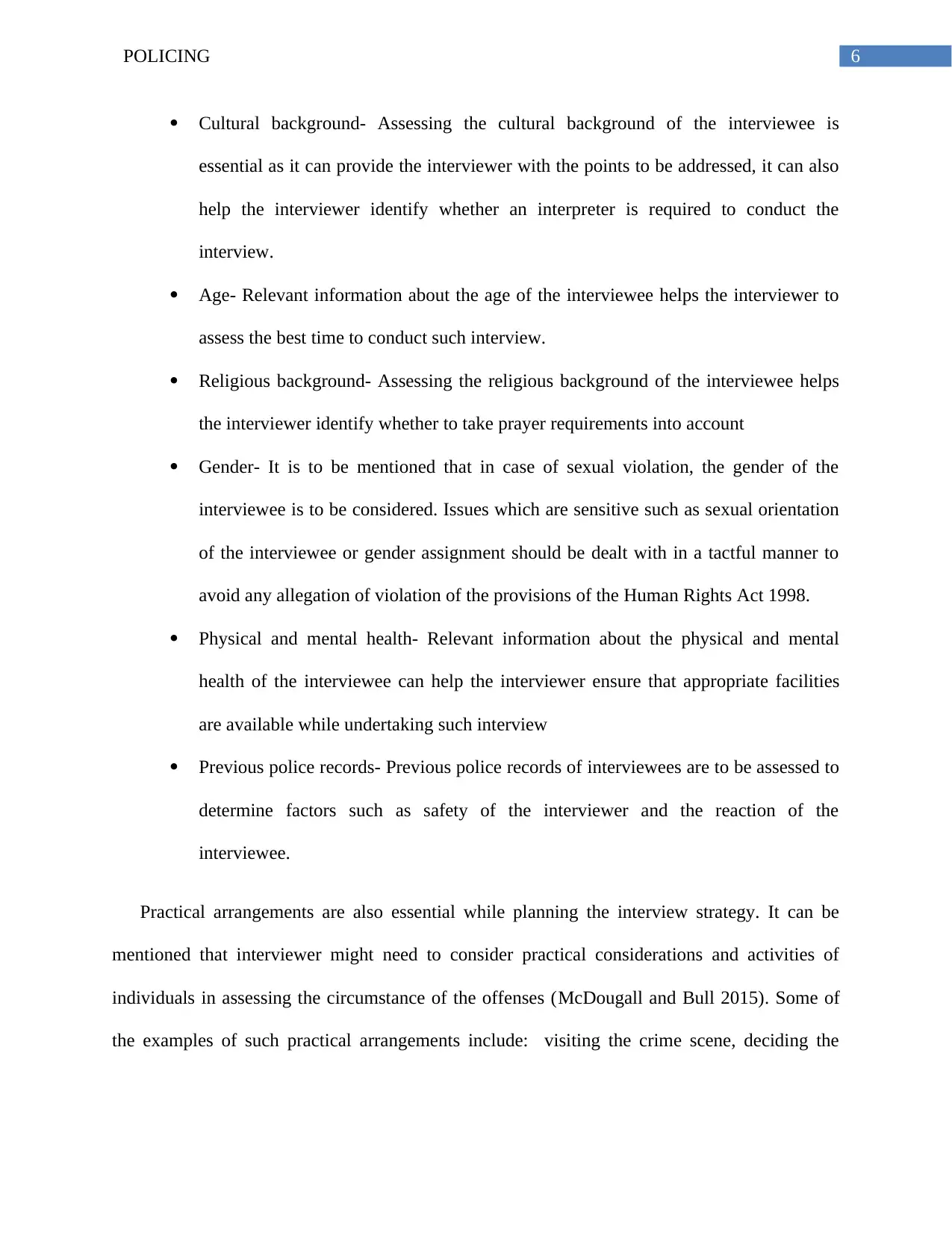
6POLICING
Cultural background- Assessing the cultural background of the interviewee is
essential as it can provide the interviewer with the points to be addressed, it can also
help the interviewer identify whether an interpreter is required to conduct the
interview.
Age- Relevant information about the age of the interviewee helps the interviewer to
assess the best time to conduct such interview.
Religious background- Assessing the religious background of the interviewee helps
the interviewer identify whether to take prayer requirements into account
Gender- It is to be mentioned that in case of sexual violation, the gender of the
interviewee is to be considered. Issues which are sensitive such as sexual orientation
of the interviewee or gender assignment should be dealt with in a tactful manner to
avoid any allegation of violation of the provisions of the Human Rights Act 1998.
Physical and mental health- Relevant information about the physical and mental
health of the interviewee can help the interviewer ensure that appropriate facilities
are available while undertaking such interview
Previous police records- Previous police records of interviewees are to be assessed to
determine factors such as safety of the interviewer and the reaction of the
interviewee.
Practical arrangements are also essential while planning the interview strategy. It can be
mentioned that interviewer might need to consider practical considerations and activities of
individuals in assessing the circumstance of the offenses (McDougall and Bull 2015). Some of
the examples of such practical arrangements include: visiting the crime scene, deciding the
Cultural background- Assessing the cultural background of the interviewee is
essential as it can provide the interviewer with the points to be addressed, it can also
help the interviewer identify whether an interpreter is required to conduct the
interview.
Age- Relevant information about the age of the interviewee helps the interviewer to
assess the best time to conduct such interview.
Religious background- Assessing the religious background of the interviewee helps
the interviewer identify whether to take prayer requirements into account
Gender- It is to be mentioned that in case of sexual violation, the gender of the
interviewee is to be considered. Issues which are sensitive such as sexual orientation
of the interviewee or gender assignment should be dealt with in a tactful manner to
avoid any allegation of violation of the provisions of the Human Rights Act 1998.
Physical and mental health- Relevant information about the physical and mental
health of the interviewee can help the interviewer ensure that appropriate facilities
are available while undertaking such interview
Previous police records- Previous police records of interviewees are to be assessed to
determine factors such as safety of the interviewer and the reaction of the
interviewee.
Practical arrangements are also essential while planning the interview strategy. It can be
mentioned that interviewer might need to consider practical considerations and activities of
individuals in assessing the circumstance of the offenses (McDougall and Bull 2015). Some of
the examples of such practical arrangements include: visiting the crime scene, deciding the
Paraphrase This Document
Need a fresh take? Get an instant paraphrase of this document with our AI Paraphraser
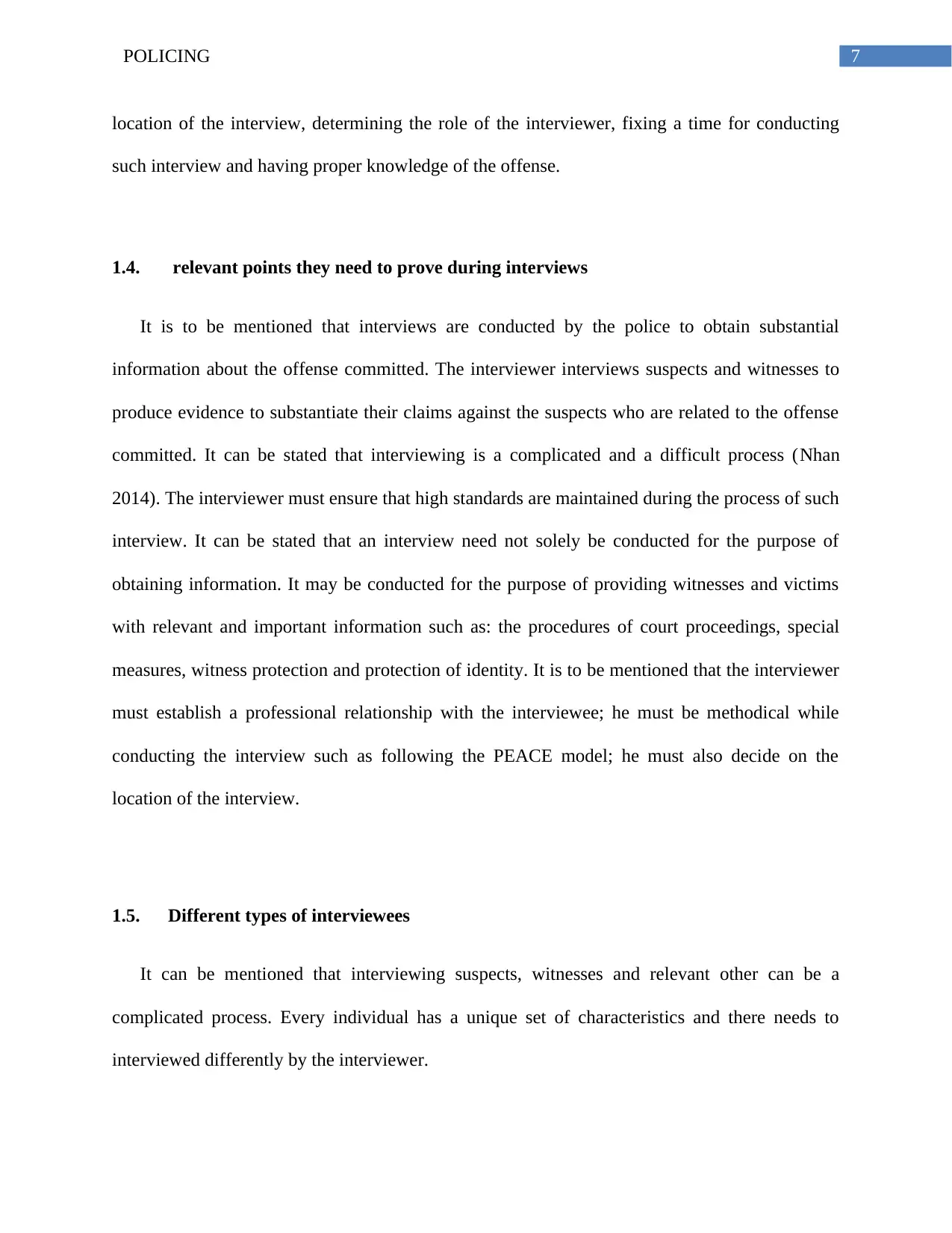
7POLICING
location of the interview, determining the role of the interviewer, fixing a time for conducting
such interview and having proper knowledge of the offense.
1.4. relevant points they need to prove during interviews
It is to be mentioned that interviews are conducted by the police to obtain substantial
information about the offense committed. The interviewer interviews suspects and witnesses to
produce evidence to substantiate their claims against the suspects who are related to the offense
committed. It can be stated that interviewing is a complicated and a difficult process (Nhan
2014). The interviewer must ensure that high standards are maintained during the process of such
interview. It can be stated that an interview need not solely be conducted for the purpose of
obtaining information. It may be conducted for the purpose of providing witnesses and victims
with relevant and important information such as: the procedures of court proceedings, special
measures, witness protection and protection of identity. It is to be mentioned that the interviewer
must establish a professional relationship with the interviewee; he must be methodical while
conducting the interview such as following the PEACE model; he must also decide on the
location of the interview.
1.5. Different types of interviewees
It can be mentioned that interviewing suspects, witnesses and relevant other can be a
complicated process. Every individual has a unique set of characteristics and there needs to
interviewed differently by the interviewer.
location of the interview, determining the role of the interviewer, fixing a time for conducting
such interview and having proper knowledge of the offense.
1.4. relevant points they need to prove during interviews
It is to be mentioned that interviews are conducted by the police to obtain substantial
information about the offense committed. The interviewer interviews suspects and witnesses to
produce evidence to substantiate their claims against the suspects who are related to the offense
committed. It can be stated that interviewing is a complicated and a difficult process (Nhan
2014). The interviewer must ensure that high standards are maintained during the process of such
interview. It can be stated that an interview need not solely be conducted for the purpose of
obtaining information. It may be conducted for the purpose of providing witnesses and victims
with relevant and important information such as: the procedures of court proceedings, special
measures, witness protection and protection of identity. It is to be mentioned that the interviewer
must establish a professional relationship with the interviewee; he must be methodical while
conducting the interview such as following the PEACE model; he must also decide on the
location of the interview.
1.5. Different types of interviewees
It can be mentioned that interviewing suspects, witnesses and relevant other can be a
complicated process. Every individual has a unique set of characteristics and there needs to
interviewed differently by the interviewer.
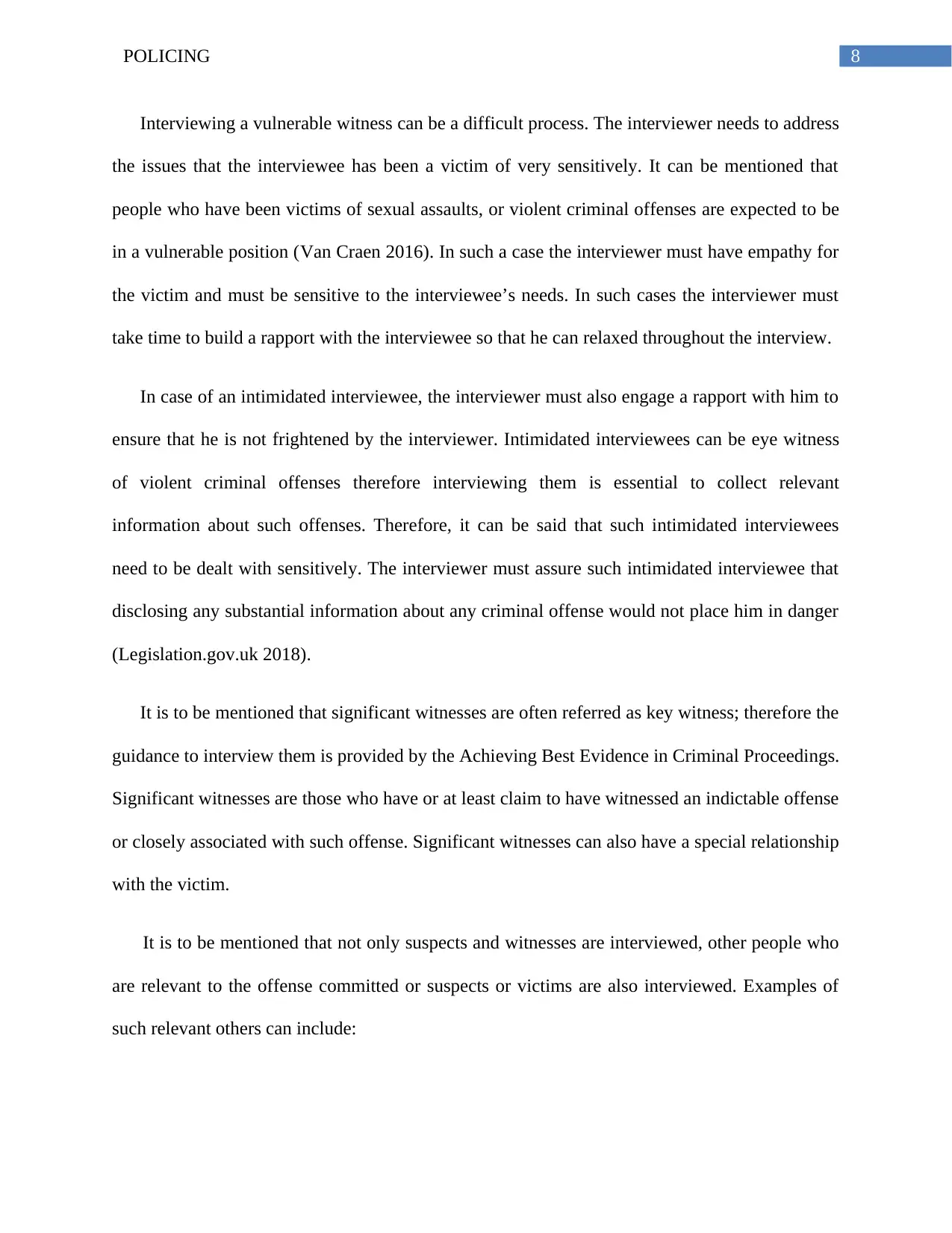
8POLICING
Interviewing a vulnerable witness can be a difficult process. The interviewer needs to address
the issues that the interviewee has been a victim of very sensitively. It can be mentioned that
people who have been victims of sexual assaults, or violent criminal offenses are expected to be
in a vulnerable position (Van Craen 2016). In such a case the interviewer must have empathy for
the victim and must be sensitive to the interviewee’s needs. In such cases the interviewer must
take time to build a rapport with the interviewee so that he can relaxed throughout the interview.
In case of an intimidated interviewee, the interviewer must also engage a rapport with him to
ensure that he is not frightened by the interviewer. Intimidated interviewees can be eye witness
of violent criminal offenses therefore interviewing them is essential to collect relevant
information about such offenses. Therefore, it can be said that such intimidated interviewees
need to be dealt with sensitively. The interviewer must assure such intimidated interviewee that
disclosing any substantial information about any criminal offense would not place him in danger
(Legislation.gov.uk 2018).
It is to be mentioned that significant witnesses are often referred as key witness; therefore the
guidance to interview them is provided by the Achieving Best Evidence in Criminal Proceedings.
Significant witnesses are those who have or at least claim to have witnessed an indictable offense
or closely associated with such offense. Significant witnesses can also have a special relationship
with the victim.
It is to be mentioned that not only suspects and witnesses are interviewed, other people who
are relevant to the offense committed or suspects or victims are also interviewed. Examples of
such relevant others can include:
Interviewing a vulnerable witness can be a difficult process. The interviewer needs to address
the issues that the interviewee has been a victim of very sensitively. It can be mentioned that
people who have been victims of sexual assaults, or violent criminal offenses are expected to be
in a vulnerable position (Van Craen 2016). In such a case the interviewer must have empathy for
the victim and must be sensitive to the interviewee’s needs. In such cases the interviewer must
take time to build a rapport with the interviewee so that he can relaxed throughout the interview.
In case of an intimidated interviewee, the interviewer must also engage a rapport with him to
ensure that he is not frightened by the interviewer. Intimidated interviewees can be eye witness
of violent criminal offenses therefore interviewing them is essential to collect relevant
information about such offenses. Therefore, it can be said that such intimidated interviewees
need to be dealt with sensitively. The interviewer must assure such intimidated interviewee that
disclosing any substantial information about any criminal offense would not place him in danger
(Legislation.gov.uk 2018).
It is to be mentioned that significant witnesses are often referred as key witness; therefore the
guidance to interview them is provided by the Achieving Best Evidence in Criminal Proceedings.
Significant witnesses are those who have or at least claim to have witnessed an indictable offense
or closely associated with such offense. Significant witnesses can also have a special relationship
with the victim.
It is to be mentioned that not only suspects and witnesses are interviewed, other people who
are relevant to the offense committed or suspects or victims are also interviewed. Examples of
such relevant others can include:
⊘ This is a preview!⊘
Do you want full access?
Subscribe today to unlock all pages.

Trusted by 1+ million students worldwide
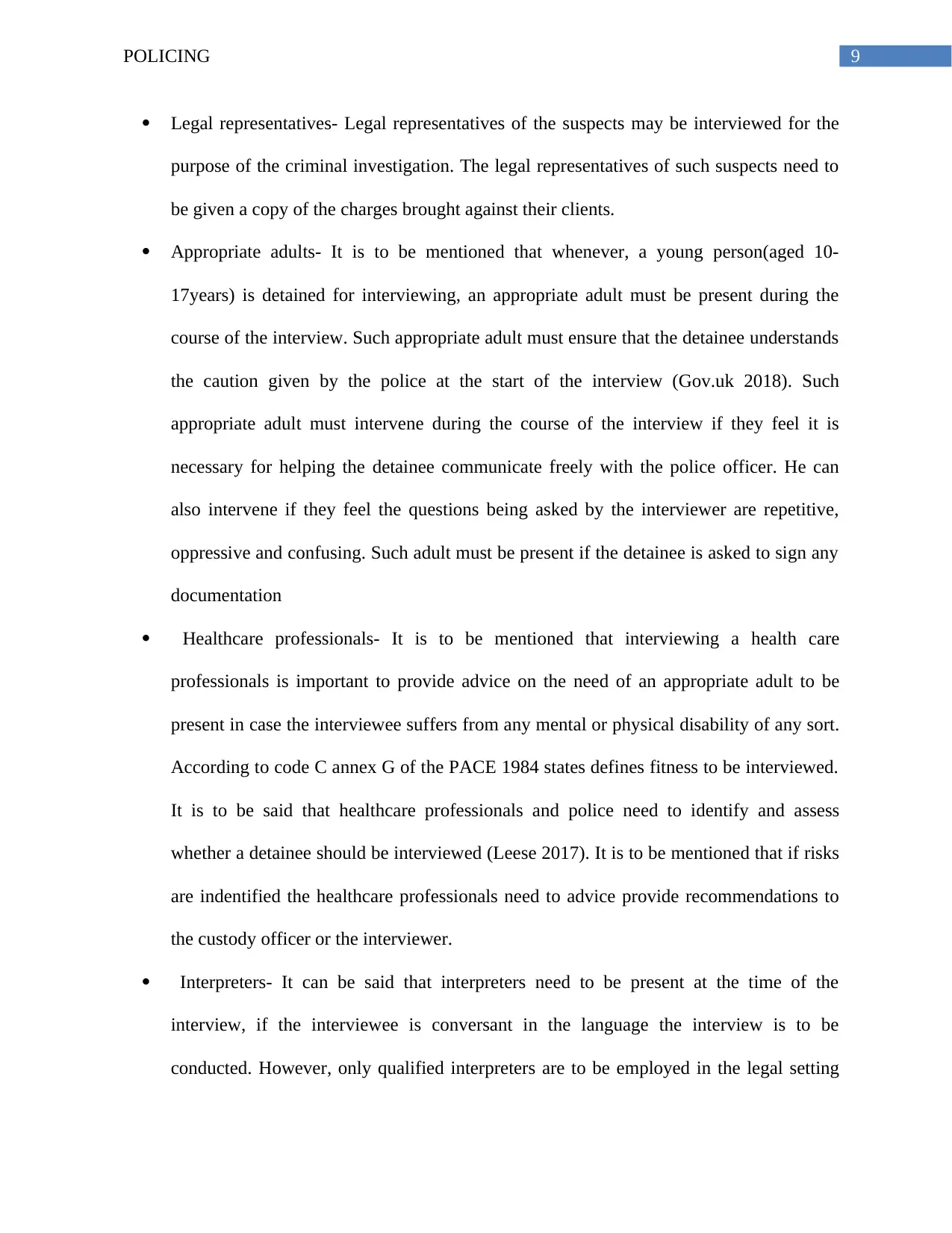
9POLICING
Legal representatives- Legal representatives of the suspects may be interviewed for the
purpose of the criminal investigation. The legal representatives of such suspects need to
be given a copy of the charges brought against their clients.
Appropriate adults- It is to be mentioned that whenever, a young person(aged 10-
17years) is detained for interviewing, an appropriate adult must be present during the
course of the interview. Such appropriate adult must ensure that the detainee understands
the caution given by the police at the start of the interview (Gov.uk 2018). Such
appropriate adult must intervene during the course of the interview if they feel it is
necessary for helping the detainee communicate freely with the police officer. He can
also intervene if they feel the questions being asked by the interviewer are repetitive,
oppressive and confusing. Such adult must be present if the detainee is asked to sign any
documentation
Healthcare professionals- It is to be mentioned that interviewing a health care
professionals is important to provide advice on the need of an appropriate adult to be
present in case the interviewee suffers from any mental or physical disability of any sort.
According to code C annex G of the PACE 1984 states defines fitness to be interviewed.
It is to be said that healthcare professionals and police need to identify and assess
whether a detainee should be interviewed (Leese 2017). It is to be mentioned that if risks
are indentified the healthcare professionals need to advice provide recommendations to
the custody officer or the interviewer.
Interpreters- It can be said that interpreters need to be present at the time of the
interview, if the interviewee is conversant in the language the interview is to be
conducted. However, only qualified interpreters are to be employed in the legal setting
Legal representatives- Legal representatives of the suspects may be interviewed for the
purpose of the criminal investigation. The legal representatives of such suspects need to
be given a copy of the charges brought against their clients.
Appropriate adults- It is to be mentioned that whenever, a young person(aged 10-
17years) is detained for interviewing, an appropriate adult must be present during the
course of the interview. Such appropriate adult must ensure that the detainee understands
the caution given by the police at the start of the interview (Gov.uk 2018). Such
appropriate adult must intervene during the course of the interview if they feel it is
necessary for helping the detainee communicate freely with the police officer. He can
also intervene if they feel the questions being asked by the interviewer are repetitive,
oppressive and confusing. Such adult must be present if the detainee is asked to sign any
documentation
Healthcare professionals- It is to be mentioned that interviewing a health care
professionals is important to provide advice on the need of an appropriate adult to be
present in case the interviewee suffers from any mental or physical disability of any sort.
According to code C annex G of the PACE 1984 states defines fitness to be interviewed.
It is to be said that healthcare professionals and police need to identify and assess
whether a detainee should be interviewed (Leese 2017). It is to be mentioned that if risks
are indentified the healthcare professionals need to advice provide recommendations to
the custody officer or the interviewer.
Interpreters- It can be said that interpreters need to be present at the time of the
interview, if the interviewee is conversant in the language the interview is to be
conducted. However, only qualified interpreters are to be employed in the legal setting
Paraphrase This Document
Need a fresh take? Get an instant paraphrase of this document with our AI Paraphraser
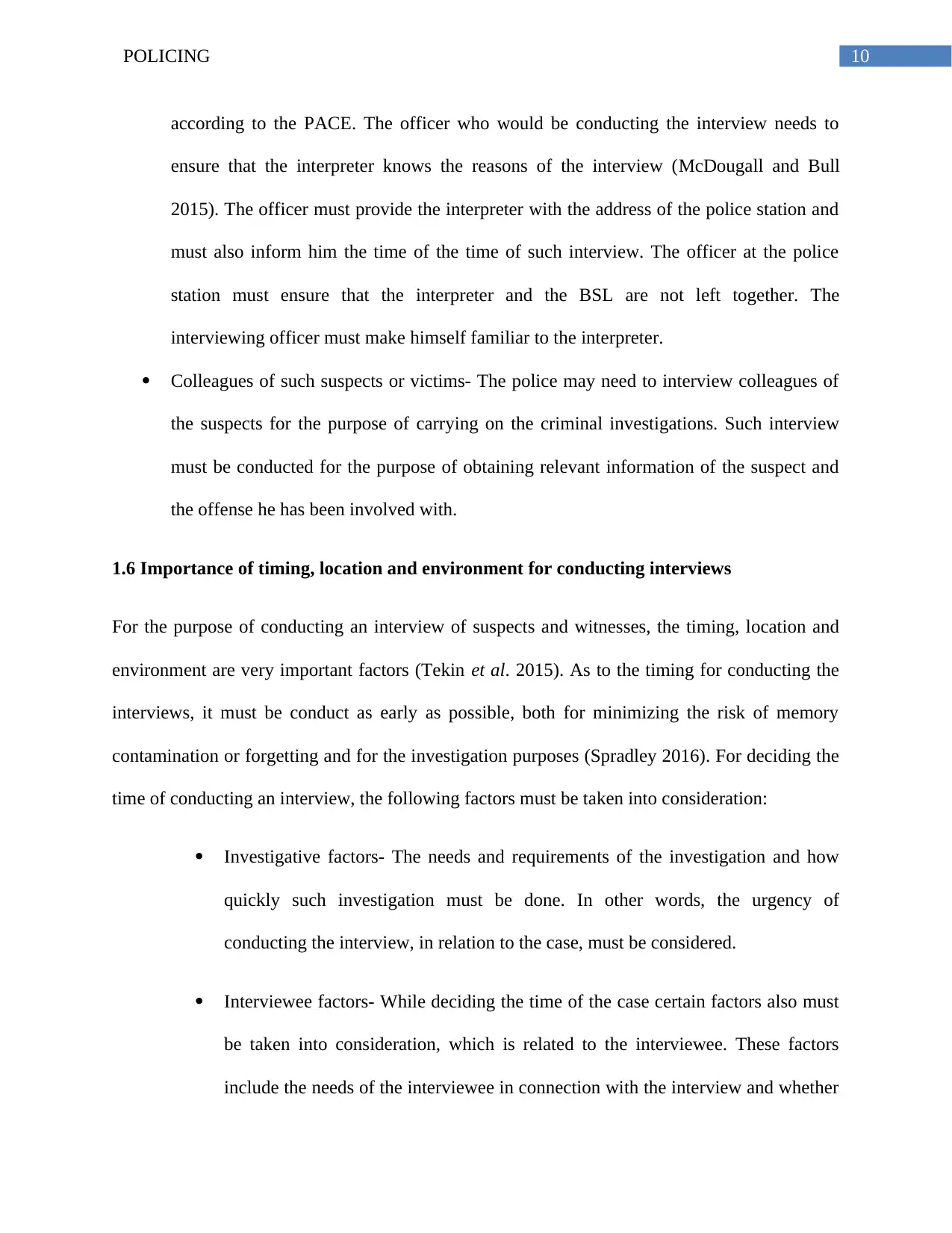
10POLICING
according to the PACE. The officer who would be conducting the interview needs to
ensure that the interpreter knows the reasons of the interview (McDougall and Bull
2015). The officer must provide the interpreter with the address of the police station and
must also inform him the time of the time of such interview. The officer at the police
station must ensure that the interpreter and the BSL are not left together. The
interviewing officer must make himself familiar to the interpreter.
Colleagues of such suspects or victims- The police may need to interview colleagues of
the suspects for the purpose of carrying on the criminal investigations. Such interview
must be conducted for the purpose of obtaining relevant information of the suspect and
the offense he has been involved with.
1.6 Importance of timing, location and environment for conducting interviews
For the purpose of conducting an interview of suspects and witnesses, the timing, location and
environment are very important factors (Tekin et al. 2015). As to the timing for conducting the
interviews, it must be conduct as early as possible, both for minimizing the risk of memory
contamination or forgetting and for the investigation purposes (Spradley 2016). For deciding the
time of conducting an interview, the following factors must be taken into consideration:
Investigative factors- The needs and requirements of the investigation and how
quickly such investigation must be done. In other words, the urgency of
conducting the interview, in relation to the case, must be considered.
Interviewee factors- While deciding the time of the case certain factors also must
be taken into consideration, which is related to the interviewee. These factors
include the needs of the interviewee in connection with the interview and whether
according to the PACE. The officer who would be conducting the interview needs to
ensure that the interpreter knows the reasons of the interview (McDougall and Bull
2015). The officer must provide the interpreter with the address of the police station and
must also inform him the time of the time of such interview. The officer at the police
station must ensure that the interpreter and the BSL are not left together. The
interviewing officer must make himself familiar to the interpreter.
Colleagues of such suspects or victims- The police may need to interview colleagues of
the suspects for the purpose of carrying on the criminal investigations. Such interview
must be conducted for the purpose of obtaining relevant information of the suspect and
the offense he has been involved with.
1.6 Importance of timing, location and environment for conducting interviews
For the purpose of conducting an interview of suspects and witnesses, the timing, location and
environment are very important factors (Tekin et al. 2015). As to the timing for conducting the
interviews, it must be conduct as early as possible, both for minimizing the risk of memory
contamination or forgetting and for the investigation purposes (Spradley 2016). For deciding the
time of conducting an interview, the following factors must be taken into consideration:
Investigative factors- The needs and requirements of the investigation and how
quickly such investigation must be done. In other words, the urgency of
conducting the interview, in relation to the case, must be considered.
Interviewee factors- While deciding the time of the case certain factors also must
be taken into consideration, which is related to the interviewee. These factors
include the needs of the interviewee in connection with the interview and whether
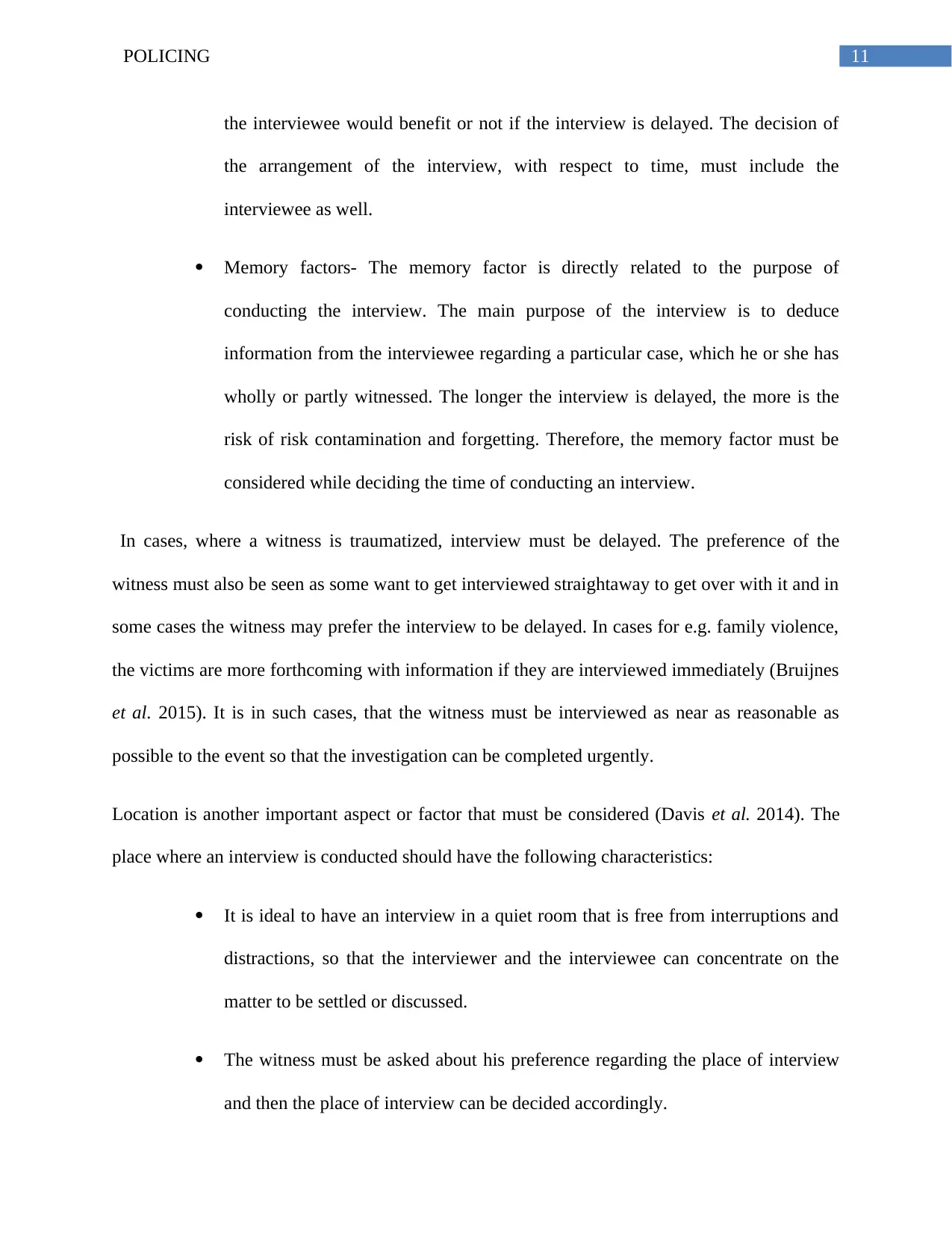
11POLICING
the interviewee would benefit or not if the interview is delayed. The decision of
the arrangement of the interview, with respect to time, must include the
interviewee as well.
Memory factors- The memory factor is directly related to the purpose of
conducting the interview. The main purpose of the interview is to deduce
information from the interviewee regarding a particular case, which he or she has
wholly or partly witnessed. The longer the interview is delayed, the more is the
risk of risk contamination and forgetting. Therefore, the memory factor must be
considered while deciding the time of conducting an interview.
In cases, where a witness is traumatized, interview must be delayed. The preference of the
witness must also be seen as some want to get interviewed straightaway to get over with it and in
some cases the witness may prefer the interview to be delayed. In cases for e.g. family violence,
the victims are more forthcoming with information if they are interviewed immediately (Bruijnes
et al. 2015). It is in such cases, that the witness must be interviewed as near as reasonable as
possible to the event so that the investigation can be completed urgently.
Location is another important aspect or factor that must be considered (Davis et al. 2014). The
place where an interview is conducted should have the following characteristics:
It is ideal to have an interview in a quiet room that is free from interruptions and
distractions, so that the interviewer and the interviewee can concentrate on the
matter to be settled or discussed.
The witness must be asked about his preference regarding the place of interview
and then the place of interview can be decided accordingly.
the interviewee would benefit or not if the interview is delayed. The decision of
the arrangement of the interview, with respect to time, must include the
interviewee as well.
Memory factors- The memory factor is directly related to the purpose of
conducting the interview. The main purpose of the interview is to deduce
information from the interviewee regarding a particular case, which he or she has
wholly or partly witnessed. The longer the interview is delayed, the more is the
risk of risk contamination and forgetting. Therefore, the memory factor must be
considered while deciding the time of conducting an interview.
In cases, where a witness is traumatized, interview must be delayed. The preference of the
witness must also be seen as some want to get interviewed straightaway to get over with it and in
some cases the witness may prefer the interview to be delayed. In cases for e.g. family violence,
the victims are more forthcoming with information if they are interviewed immediately (Bruijnes
et al. 2015). It is in such cases, that the witness must be interviewed as near as reasonable as
possible to the event so that the investigation can be completed urgently.
Location is another important aspect or factor that must be considered (Davis et al. 2014). The
place where an interview is conducted should have the following characteristics:
It is ideal to have an interview in a quiet room that is free from interruptions and
distractions, so that the interviewer and the interviewee can concentrate on the
matter to be settled or discussed.
The witness must be asked about his preference regarding the place of interview
and then the place of interview can be decided accordingly.
⊘ This is a preview!⊘
Do you want full access?
Subscribe today to unlock all pages.

Trusted by 1+ million students worldwide
1 out of 26
Related Documents
Your All-in-One AI-Powered Toolkit for Academic Success.
+13062052269
info@desklib.com
Available 24*7 on WhatsApp / Email
![[object Object]](/_next/static/media/star-bottom.7253800d.svg)
Unlock your academic potential
Copyright © 2020–2026 A2Z Services. All Rights Reserved. Developed and managed by ZUCOL.





